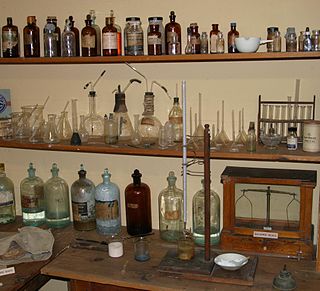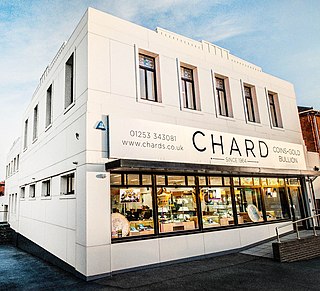
Bullion is non-ferrous metal that has been refined to a high standard of elemental purity. The term is ordinarily applied to bulk metal used in the production of coins and especially to precious metals such as gold and silver. It comes from the Anglo-Norman term for a melting-house where metal was refined, and earlier from French bouillon, "boiling". Although precious metal bullion is no longer used to make coins for general circulation, it continues to be held as an investment with a reputation for stability in periods of economic uncertainty. To assess the purity of gold bullion, the centuries-old technique of fire assay is still employed, together with modern spectroscopic instrumentation, to accurately determine its quality.

The Perth Mint is Australia's official bullion mint and wholly owned by the Government of Western Australia. Established on 20 June 1899, two years before Australia's Federation in 1901, the Perth Mint was the last of three Australian colonial branches of the United Kingdom's Royal Mint intended to refine gold from the gold rushes and to mint gold sovereigns and half-sovereigns for the British Empire. Along with the Royal Australian Mint, which produces coins of the Australian dollar for circulation, the Perth Mint is the older of Australia's two mints issuing coins that are legal tender.

Of all the precious metals, gold is the most popular as an investment. Investors generally buy gold as a way of diversifying risk, especially through the use of futures contracts and derivatives. The gold market is subject to speculation and volatility as are other markets. Compared to other precious metals used for investment, gold has been the most effective safe haven across a number of countries.
e-Bullion was an Internet-based digital gold currency founded by Jim and Pamela Fayed of Moorpark, California, as part of their Goldfinger Coin & Bullion group of companies. The company was incorporated in 2000 and launched on July 4, 2001. Similar to competing systems such as e-gold, e-Bullion allowed for the instant transfer of gold and silver between user accounts. e-Bullion was a registered legal corporate entity of Panama.

Silver may be used as an investment like other precious metals. It has been regarded as a form of money and store of value for more than 4,000 years, although it lost its role as legal tender in developed countries when the use of the silver standard came to an end in 1935. Some countries mint bullion and collector coins, however, such as the American Silver Eagle with nominal face values. In 2009, the main demand for silver was for: industrial applications (40%), jewellery, bullion coins and exchange-traded products. In 2011, the global silver reserves amounted to 530,000 tonnes.
The Canadian Platinum Maple Leaf is the official bullion platinum coin of Canada. First issued by the Royal Canadian Mint in 1988, it was available until 2002 in five different denominations, all of which are marked as containing .9995 pure platinum. The bullion coin was partly reintroduced in 2009 in the form of the 1 troy ounce denomination in .9999 purity, featuring a new portrait of Queen Elizabeth II on the obverse. The coins have legal tender status in Canada, but as is often the case with bullion coins, the face values of these coins is lower than the market price of the material they are made from.
Envela Corporation, incorporated on September 17, 1965, is a holding company owning subsidiaries engaged in various business activities with a focus on recommerce. Envela's segments include retail stores, e-commerce, de-manufacturing, recycling, IT asset disposition (ITAD), and reverse logistics. Envela Corporation is divided into two sectors: DGSE, LLC and ECHG.
Rand Refinery (Pty) Limited is the world's largest integrated single-site precious metals refining and smelting complex. It was established in 1920 to refine gold within South Africa, which had previously been refined in London.
Cash4Gold was a company which purchased gold, silver, and platinum, primarily from jewelry mailed in by customers. In 2012, the company declared insolvency and its assets were purchased by Direct Holdings Global.

A metallurgical assay is a compositional analysis of an ore, metal, or alloy, usually performed in order to test for purity or quality.
Nicolas Louis Deák was a Hungarian-born American banker, chairman of the Deak-Perera group and a secret service operative, serving both in the OSS during World War II and its successor the CIA during the Cold War.
Philip Noel Diehl is an American businessman and former monetary policy advisor who served as the 35th director of the United States Mint. He is the president of U.S. Money Reserve, a published analyst of gold markets and a member of the boards of the Industry Council for Tangible Assets, the Coalition for Equitable Regulation and Taxation and the Gold and Silver Political Action Committee.
The London bullion market is a wholesale over-the-counter market for the trading of gold, silver, platinum and palladium. Trading is conducted amongst members of the London Bullion Market Association (LBMA), tightly overseen by the Bank of England. Most of the members are major international banks or bullion dealers and refiners.
Coins 'N Things, also known as CNT Inc., is a privately held, family-controlled business in Bridgewater, Massachusetts, that was established as a retail shop for coin collectors and is now the largest wholesale vendor of gold in the United States.
Texas Precious Metals, based in Shiner, Texas, is one of the largest precious metals dealers in the United States. The company reported annual revenues of $180.1 million in 2013 and $153.2 million in 2014. The company is recognized as a market maker for United States Mint products and is an official distributor for the Perth Mint of Australia.
A gold IRA or precious metals IRA is an Individual Retirement Account in which physical gold or other approved precious metals are held in custody for the benefit of the IRA account owner. It functions the same as a regular IRA, only instead of holding paper assets, it holds physical bullion coins or bars. Precious metals IRAs are usually self-directed IRAs, a type of IRA where the custodian allows more diverse investments to be held in the account.

Delaware Depository is a privately held precious metals custody and distribution center founded in 1999. Located in Wilmington, Delaware, Delaware Depository provides precious metals bullion custody, safekeeping, and distribution services for IRA custodians, financial institutions, broker-dealers, refiners, and individual investors. Customers have the option of storing bullion in either Wilmington, DE, Orange County, CA, or internationally, in Canada or Switzerland.

The Texas Bullion Depository is a bullion depository based in Texas in the United States. It was the first state-administered depository to be established in the United States; previous depositories were either at federal level or private companies. Texas Comptroller Glenn Hegar announced it was open for business on June 6, 2018.
A-Mark Precious Metals is a precious metals trading company. It was the first company allowed to make and sell coins from the metals recovered in the shipwreck of SS Gairsoppa. A-Mark is traded on Nasdaq and is a Fortune 500 company as of 2021.

Chard (1964) Ltd, operating as Chard Coin and Bullion Dealer, is a long-standing coin and bullion dealer based in Blackpool, UK. Its coins range from ancient to modern-day issues. Originally a numismatic company, it grew into the bullion market, offering gold, silver, platinum and palladium products to an international customer base.












